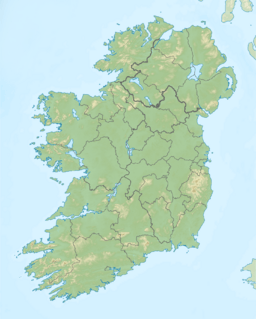Lough O'Flynn facts for kids
Quick facts for kids Lough O'Flynn |
|
|---|---|
| Location | County Roscommon |
| Coordinates | 53°45′52″N 8°37′52″W / 53.76444°N 8.63111°W |
| Native name | Loch Uí Fhloinn Error {{native name checker}}: parameter value is malformed (help) |
| Primary inflows | River Suck |
| Primary outflows | River Suck |
| Catchment area | 18.35 km2 (7.1 sq mi) |
| Basin countries | Ireland |
| Max. length | 2.3 km (1.4 mi) |
| Max. width | 0.8 km (0.5 mi) |
| Surface area | 1.37 km2 (0.53 sq mi) |
| Average depth | 4.5 m (15 ft) |
| Max. depth | 16.5 m (54 ft) |
| Surface elevation | 77 m (253 ft) |
Lough O'Flynn is a beautiful freshwater lake in the west of Ireland. It is located in west County Roscommon. This lake is special because it is the starting point, or "source," of the River Suck.
Contents
The Story Behind the Name
The name Lough O'Flynn (or Loch Uí Fhloinn in Irish) comes from an old Irish family called the Ó Floinn. This tribe was very important in the Middle Ages. They ruled a region known as Síol Maelruain. The Ó Floinn family was one of the main groups in the Kiltullagh area.
Where is Lough O'Flynn?
Lough O'Flynn is about 2 kilometers (1.2 miles) long and 1 kilometer (0.6 miles) wide. You can find it about 10 kilometers (6 miles) east of Ballyhaunis. It is just north of the village of Ballinlough. As mentioned, it's where the River Suck begins its journey.
Ancient Island in the Lake
There is a special artificial island in the lake called a crannog. People believe this crannog was built during the Medieval period. Back then, it was used as a safe place. People could retreat to it for safety if they were attacked.
Exploring Around the Lake
You can find marked trails around Lough O'Flynn. These trails follow old bog tracks. They offer amazing views of the lake and the river. You can also see the surrounding areas, which include bog scrub, forests of cone-bearing trees, and open peatland.
Plants and Animals of Lough O'Flynn
Lough O'Flynn is home to many different kinds of fish. You might find roach, perch, brown trout, and pike. The lake is also home to the European eel, which is a critically endangered species. This means it is very important to protect them.
The Carrowbehy/Caher Bog
Next to the lake is a special area called the Carrowbehy/Caher Bog. This is a type of raised bog. It is protected as a Special Area of Conservation. This means it's a very important natural habitat.
What is a Raised Bog?
In an active raised bog, you'll see a lot of sphagnum moss. This moss helps new peat to form. In this particular bog, there are bumpy areas called hummocks. There are also "quaking" areas that feel soft underfoot. Many large, deep pools of water are also found here.
Plants You Might See
Besides the sphagnum moss, you can find other interesting plants. These include bogbean, cotton grass, bog sedge, white beak sedge, and lesser bladderwort. In parts of the bog where peat was removed long ago, you might see heather, bog asphodel, hare’s-tail cottongrass, deergrass, and cross-leaved heath.
 | Jessica Watkins |
 | Robert Henry Lawrence Jr. |
 | Mae Jemison |
 | Sian Proctor |
 | Guion Bluford |


